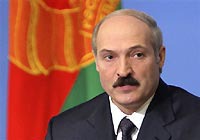Belarus's Lukashenko Does Not Know What To Do With So Much Enriched Uranium
Removal of nuclear weapons from Belarus that occurred in 1996 was “a major mistake,” President of Belarus Alexander Lukashenko told media on 14 April during his working visit to Gomel region.

In his address, Belarus leader criticized Stanislav Shushkevich, the first post-Soviet leader of the country. In 1994 he undertook to move from Belarus to Russia a part of nuclear arsenal of the Soviet Union. It was done two years later, when Lukashenko was leading the country. That was the time when the President had to sign the final document regarding the issue.
“I had to ink the document because there was no other way out: both Russia and the USA pressured me to remove the weapons because we had made the promise. We should not have done it, it was a greatest heritage, an expensive product that we would have sold it at a hefty price in the end. If we still had these weapons, you would be taking to us in a different way now. But we’ve removed them. Can we have our security? No,” he said.
At the same time, Alexander Lukashenko said that Belarus has kept hundreds of kilograms of highly enriched uranium. “For many years they’ve been telling me: remove the uranium. Either to Russia or to America, we will pay you,” said Lukashenko.
Then the Belarus leader used a few metaphors to emphasize his position: “I am now with my back against the wall. With a knife to my throat they demand to give the uranium away. I tell them: we gave away the nuclear weapons once and what do we have now?” remarked the head of state.
He also reassured the world community that Belarus was not going to use the uranium for weapons production. “I tell them: why do you dictate our actions? It is our commodity. We keep it under IAEA control. We are not going to make and sell dirty bombs. We use the uranium for research purposes,” he emphasized .
He then said that nobody will be allowed to dictate conditions to Belarus: “Let’s negotiate what should be done with this large amount of enriched uranium”.
Them the Belarus leader complained that he was not invited for the world summit on nuclear matters held in Washington on April 12-13. Presidents of Russia, Ukraine and Kazakhstan participated in the summit. At some point, Ukraine and Kazakhstan also had a part of Soviet nuclear arsenal which was taken to Russia in early 1990s.
“If you don’t want to give away the uranium, we will not invite you to the summit,” Lukashenko said. He said that unwillingness to invite Belarus to the summit is the proof that Americans and the West in general are not trustworthy.
“I will not allow anyone to bend over Belarus. We will talk only respectfully, like partners however hard America or Russia may pressure us. The pressure is from two sides and we feel it,” he added.
Alexander Lukashenko added “if Russia, Kazakhstan and other CIS states had been reliable friends, they would have made it a firm point: Belarus is ours and must attend the summit. Americans would have had nothing to do but agree.”
In conclusion, Lukashenko remarked that he is calm about the situation. “It is more pleasant for me to talk to you on the bank of the River Pripyat than sweat it out in Washington.”
Four years ago Lukashenko spoke differently. He assured that there was no necessity in dislocating Russian nuclear weapons in his country, although this possibility was discussed by the military of both countries.
“There is no necessity in dislocating nuclear weapons in the first strike zone. Russia has enough nuclear weapons that can be used in Belarus, if necessary. I think the situation that necessitates delivery of these weapons will not arise,” he said then.
Now it seems that there is such necessity. Most likely, the Belarus President had to have his own weapons of mass destruction and not the weapons that belong to his ally. He thinks that it would strengthen Belarus authority in the world and make Russia, the US and others speak to Belarus respectfully.
It may be that Lukashenko was simply offended that he was not wanted in Washington. And he is right. For the last 15 years the US have been calling him “the last dictator of Europe.” The warming of relations between Belarus and the West in the last couple of years mostly concerns the connections between Minsk and Brussels rather than Washington.
Americans tried to pretend that Belarus plays no important role in Europe and can be ignored. Yet, presence of large amounts of enriched uranium and nuclear technologies indicates the opposite. No matter how unpleased Washington is with Lukashenko, it should have probably invited him to the summit.
Vadim Trukhachev
Pravda.Ru
Subscribe to Pravda.Ru Telegram channel, Facebook, RSS!





